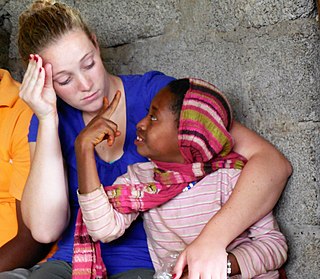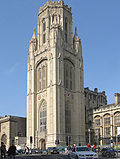Related Research Articles

British Sign Language (BSL) is a sign language used in the United Kingdom (UK), and is the first or preferred language among the Deaf community in the UK. Based on the percentage of people who reported 'using British Sign Language at home' on the 2011 Scottish Census, the British Deaf Association estimates there are 151,000 BSL users in the UK, of which 87,000 are Deaf. By contrast, in the 2011 England and Wales Census 15,000 people living in England and Wales reported themselves using BSL as their main language. People who are not deaf may also use BSL, as hearing relatives of deaf people, sign language interpreters or as a result of other contact with the British Deaf community. The language makes use of space and involves movement of the hands, body, face, and head.

Gallaudet University is a private federally chartered research university in Washington, D.C. for the education of the deaf and hard of hearing. It was founded in 1864 as a grammar school for both deaf and blind children. It was the first school for the advanced education of the deaf and hard of hearing in the world and remains the only higher education institution in which all programs and services are specifically designed to accommodate deaf and hard of hearing students. Hearing students are admitted to the graduate school and a small number are also admitted as undergraduates each year. The university was named after Thomas Hopkins Gallaudet, a notable figure in the advancement of deaf education.

The UCL School of Pharmacy is the pharmacy school of University College London (UCL). The School forms part of UCL's Faculty of Life Sciences and is located in London, United Kingdom.
New Zealand Sign Language or NZSL is the main language of the deaf community in New Zealand. It became an official language of New Zealand in April 2006 under the New Zealand Sign Language Act 2006. The purpose of the act was to create rights and obligations in the use of NZSL throughout the legal system and to ensure that the Deaf community had the same access to government information and services as everybody else. According to the 2013 Census, over 20,000 New Zealanders know NZSL.

Irish Sign Language is the sign language of Ireland, used primarily in the Republic of Ireland. It is also used in Northern Ireland, alongside British Sign Language (BSL). Irish Sign Language is more closely related to French Sign Language (LSF) than to BSL, though it has influence from both languages. It has influenced sign languages in Australia and South Africa, and has little relation to either spoken Irish or English. ISL is unique among sign languages for having different gendered versions due to men and women being taught it at different schools.
Dorothy "Dot" Miles was a Welsh poet and activist in the deaf community. Throughout her life, she composed her poems in English, British Sign Language, and American Sign Language. Her work laid the foundations for modern sign language poetry in the United States and the United Kingdom. She is regarded as the pioneer of BSL poetry and her work influenced many contemporary Deaf poets.
Jeff McWhinney was born in 1960 in Belfast, Northern Ireland. He is a leader in the UK deaf community.

The Department of Computer Science is the computer science department of the University of Oxford, England, which is part of the university's Mathematical, Physical and Life Sciences Division. It was founded in 1957 as the Computing Laboratory. By 2014 the staff count was 52 members of academic staff and over 80 research staff. The 2019, 2020 and 2021 Times World University Subject Rankings places Oxford University 1st in the world for Computer Science. Oxford University is also the top university for computer science in the UK and Europe according to Business Insider. The 2020 QS University Subject Rankings places The University of Oxford 5th in the world for Computer Science.
A Master of Physics honours degree is a specific master's degree for courses in the field of physics.
Clive Mason is a Deaf Scottish television presenter and actor.
The Centre for Deaf Studies is part of the School of Linguistic, Speech and Communication Sciences, Trinity College Dublin and is the only university offering Deaf Studies related courses on the island of Ireland.
Paddy Ladd is an English Deaf scholar, author, activist and researcher of Deaf culture. Ladd was a lecturer and MSc Coordinator at the Centre for Deaf Studies at the University of Bristol. Despite considerable international pressure, the centre was wound down as the MSc was closed in 2009, the undergrad programme taught out from 2010 to 2013, and the centre finally closed in the July of that year.

Deaf studies are academic disciplines concerned with the study of the deaf social life of human groups and individuals. These constitute an interdisciplinary field that integrates contents, critiques, and methodologies from anthropology, cultural studies, economics, geography, history, political science, psychology, social studies, and sociology, among others. The field focuses on the language, culture, and lives of the deaf from the social instead of the medical perspective.
Ella Mae Lentz is a Deaf American author, poet, teacher, and advocate.

The UCL Division of Psychology and Language Sciences is a Division within the Faculty of Brain Sciences of University College London (UCL) and is located in London, United Kingdom. The Division offers teaching and training and undertakes research in psychology and communication and allied clinical and basic science. It is the largest university psychology department in England.
Bencie Woll, FBA, FAAAS is an American–British linguist and scholar of sign language. She became the first professor of sign language in the United Kingdom when she was appointed Professor of Sign Language and Deaf Studies at City University, London in 1995. In 2005, she moved to University College London where she became Professor of Sign Language and Deaf Studies and Director of the Deafness, Cognition and Language Research Centre (DCAL).
Audrey Cameron is a polymer chemist working at the University of Edinburgh. She is Deaf and uses British Sign Language.
Judith Collins was a university lecturer and researcher at Durham University. She was Deaf and a British Sign Language user.
Clark Denmark is a British activist, lecturer and interpreter. He is deaf and a British Sign Language (BSL) user, and he is widely recognised within the Deaf community for his role in advancing the recognition and wider understanding of BSL.
Lilian Keddie Lawson, OBE, is a Scottish linguist and activist. She is Deaf and a British Sign Language user.
References
- ↑ "Bristol University Milestone for Deaf People". University of Bristol. Retrieved 14 February 2016.
- ↑ "Research study to examine genetics, power and Deafhood". University of Bristol. Retrieved 14 February 2016.
- ↑ "Deafhood". Signstation. Retrieved 9 December 2015.
- ↑ Ditum, Sarah (13 May 2013). "Deaf people's linguistic culture is being allowed to disintegrate". Guardian. Retrieved 9 December 2015.
- 1 2 University of Bristol: Centre for Deaf Studies: About the Centre (accessed 12 May 2010)
- ↑ "Campaign to save deaf studies degree at Bristol Uni". BBC. 20 May 2010. Retrieved 9 December 2015.
- 1 2 3 "Save Deaf Studies". Archived from the original on 27 April 2013. Retrieved 28 January 2013.
- ↑ "Save the Centre for Deaf Studies at University of Bristol". Education Activist Network. June 2010. Retrieved 9 December 2015.
- 1 2 Napier, Jemina; Leeson, Lorraine (2015). Sign Language in Action. Palgrave Macmillan. ISBN 9781137309785.
- ↑ Gertz, Genie; Boudreault, Patrick (2016). The SAGE Deaf Studies Encyclopedia. SAGE Publications. ISBN 9781506341668.
- ↑ Kellett Bidoli, Cynthia J.; Ochse, Elana (2008). English in International Deaf Communication. Peter Lang. p. 433. ISBN 9783039116102.
- ↑ "Linda Day - Vice Chair". British Deaf Association. Retrieved 14 February 2016.
- ↑ Ladd P. Understanding Deaf Culture: In Search of Deafhood, p. xviii (Multilingual Matters; 2003) ( ISBN 1-85359-546-2)
- ↑ Snider B. A Global View. Gallaudet Today Summer 1993: 28–31 (accessed 12 May 2010)
- ↑ "Centre for Deaf Studies". University of Bristol. Archived from the original on 31 January 2016. Retrieved 9 December 2015.
- ↑ BBC News: Avon and Somerset Police trial new audio-visual phone (8 May 2010) (accessed 14 May 2010)
- ↑ "New app will help make sign language communication more accessible". University of Bristol. Retrieved 9 December 2015.
- ↑ "Innovations in information delivery for sign language users". University of Bristol. Retrieved 9 December 2015.
- ↑ "A history of CDS: the heritage that will be lost with closure". Save Deaf Studies. Retrieved 14 February 2016.
- ↑ Atherton M. Deaf studies. Independent (1 February 2008) (accessed 12 May 2010)
- ↑ Staff and students turned out in force to protest at Bristol University's plan to cut deaf studies. Bristol Evening Post (11 May 2010) Archived 13 May 2010 at the Wayback Machine (accessed 12 May 2010)
- ↑ "World's first masters degree in Deafhood Studies". University of Bristol. Retrieved 14 February 2016.
- ↑ Deafstation Archived 13 March 2010 at the Wayback Machine (accessed 12 May 2010)
- ↑ "Professor Jim Kyle". University of Bristol. Retrieved 9 December 2015.
- ↑ "Survey for a new MSc in Sign Language and Deaf Studies". Signature. 8 October 2014. Retrieved 9 December 2015.
- ↑ "Deaf Studies". Bristol Research. University of Bristol. Retrieved 14 September 2017.
- ↑ "One day after Bristol University's Centre for Deaf Studies closes, letter reveals Bristol Deaf Centre will be sold". Limping Chicken. 2 August 2013. Retrieved 9 December 2015.
